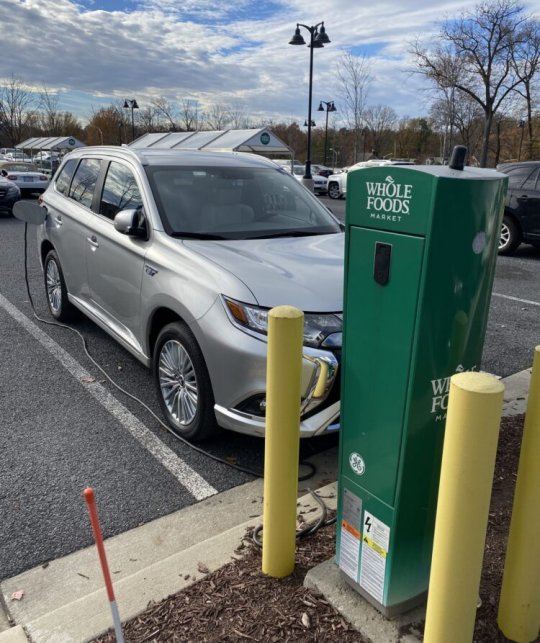 RIVERDALE, Md. --- Maryland is using state and federal money to expand the network of electric vehicle charging stations in the state. This is an electric charging station in the parking lot of the Whole Foods Market here. (James R. Carroll)
RIVERDALE, Md. --- Maryland is using state and federal money to expand the network of electric vehicle charging stations in the state. This is an electric charging station in the parking lot of the Whole Foods Market here. (James R. Carroll)WASHINGTON (October 30, 2024)—An influx of federal and state dollars is helping fund additional electric vehicle charging stations in Maryland.
In August, the Biden-Harris administration announced the winners of $521 million in grants to help build electric vehicle charging infrastructure across the United States. The Maryland Equitable Charging Infrastructure Partnership will receive more than $33 million of this funding to install electric vehicle charging stations at 29 sites along highways in the state.
The Maryland Clean Energy Center—an organization created by the state in 2008 to advance clean energy sources—is leading the partnership, which includes local governments, a local electrical workers union and other organizations. The center applied for the federal grant on behalf of the partnership and coordinated closely with the Maryland Department of Transportation.
"In order for us to achieve our greenhouse gas reduction targets and help us mitigate the impacts of climate change, we are facilitating a transition to cleaner transportation solutions," Katherine Magruder, the executive director of the center, told Capital News Service.
There are currently 118,682 electric vehicles registered in Maryland, according to the Maryland Department of Transportation.
The more than $33 million will help to increase electric vehicle charging access in "rural, urban, and underserved communities," according to the center.
"We're very conscientious about equitable access to clean energy technologies and solutions," Magruder said.
Workforce development and job creation are also crucial parts of the project, Magruder said. Apprentices and electricians with IBEW Local 24 will be trained to build and maintain the new charging stations.
Earlier this year, the Maryland Clean Energy Center received $15 million to build 58 electric vehicle community charging stations from an earlier round of federal transportation grants.
The funds come from a grant program set up by the Bipartisan Infrastructure Law, which was passed by Congress and signed into law by President Joe Biden in 2021, and money set aside in the National Electric Vehicle Infrastructure (NEVI) Formula Program, which was created by that law.
Under the formula program, states may access funding for obtaining and installing charging equipment. The program requires funds be used first on alternative fuel corridors, a network of highway systems with alternative charging and fueling stations, and then in communities.
Deron Lovaas, the chief of environment and sustainable transportation at the Maryland Department of Transportation, emphasized the importance of building out highway charging so that other funds can go toward community charging.
Maryland also received $12.1 million in federal funding from the NEVI program in July to expand charging sites, according to Gov. Wes Moore's office.
It has been an unprecedented decade for funding for electric vehicle charging, Lovaas said. The Bipartisan Infrastructure Law and the Inflation Reduction Act have funneled large amounts of money to local governments, he explained.
In 2015, there were just 419 electric vehicle charging stations in Maryland. As of June 30, there were more than 1,600, according to data from the state Department of Transportation.
Maryland will continue to seek federal funding to expand its electric vehicle infrastructure, Lovaas said. He also noted that Moore has put millions of Maryland's dollars into climate investments, including $23 million for building charging stations in historically underserved communities.
"A future where the (state's) fleet is electric is within sight, thanks to these federal investments and thanks to partners that are competing for them as effectively as possible here in Maryland," Lovaas said.
The state is also focusing on increasing the number of electric vehicles on the road and expanding charging infrastructure for trucks, Lovaas said.
A rule adopted in Maryland in 2023, called Advanced?? Clean Cars II, is requiring auto dealers in the state to increase the percentage of electric vehicles they are selling, he said.
Maryland is also collaborating with other states to expand charging stations. The Clean Corridor Coalition, which includes Maryland, Connecticut, Delaware, New Jersey and New York, is receiving nearly $250 million from the U.S. Environmental Protection Agency to build out electric vehicle charging facilities for trucks along the I-95 corridor.
These investments are crucial to protect the climate, clean the air and transition away from fossil fuels, Lindsey Mendelson, the senior clean transportation representative with the Maryland Sierra Club, told CNS.
"We're really excited about more federal dollars flowing in to support EV charging," she said. "It's important that we continue to take advantage of every opportunity that we can."


